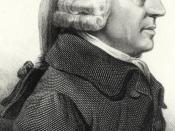North American society has been changing in its social and economic spectrums over the past two decades. In turn, the current political ideological viewpoints of liberalism have digressed toward those of John Locke and John Stuart Mill of the eighteenth century in order to compensate for these changes. Reform liberalism, the popular political ideology at that time, was insufficient to deal with the problems that were arising due to these social shifts. Society's recent turn toward classical liberalism in particular can be explained with the discussion of the main concepts on which classical liberalism is based.
Classical liberalism is composed of many ideologies that are shared by both it and reform liberalism. Reform liberalism grew from classical liberalism because of the limited nature that the classical liberal ideologies possess. The nature of classical liberalism can be viewed as limited in a negative or a positive light depending on who is being subjected to it.
The presence of the government can be interpreted as helping or detrimental. Classical liberals choose to view the state as more harmful than helping and therefore choose to promote the idea of limited government, which will be discussed further as it pertains to the economy and other social matters. Classical liberalism also promotes an ideology in which people believe in the absolute freedom from coercion by the government and in all other aspects of a person's life. This negative liberty is a major downfall of the existence of government, according to classical liberals. In the eighteenth century, when liberalism began, the monarchy was totalitarian in nature and gave rise to an ideology that saw the state as a threat to freedom and equality. Classical liberals believe in the equality of right, while reform liberals believe in the equality of opportunity. Equality of right is the right...


